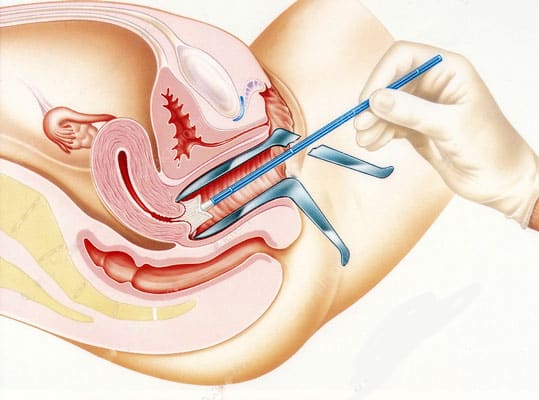Pap smear test in thane
Pap smear test and Cervical cancer screening
The Cervical Screening Test is the most effective method of lowering your risk of cervical cancer.The Cervical Screening Test detects high-risk human papillomavirus (HPV) types and may identify persons who are at risk of getting cervical cancer. For Pap Smear Test consult with our Pap smear gynecologist in Thane Dr. Arohi Tasgaonkar.
Cervical cancer is caused by HPV, which is a major risk factor. Even if you have been immunized against HPV, you should have regular cervical screenings.
Cervical cancer screening may include the following tests and procedures:
- HPV screening This test is performed on a sample of cells taken from the cervix, which is the same sample used for the Pap test. This sample is tested for the HPV strains most typically associated with cervical cancer. HPV testing may be done alone or in conjunction with a Pap test.
- Pap smear: The most prevalent test for early alterations in cells that might develop to cervical cancer has been the Pap test. This test is also known as a Pap smear. A Pap test includes collecting a sample of cervix cells. It is often performed concurrently with a bimanual pelvic exam as part of a gynecologic examination. A Pap test and an HPV test may be combined.
Testing and cervical cancer screening procedures
The following Pap test criteria are recommended Obstetricians and Gynecologists:
- Cervical cancer screening should begin when a woman reaches the age of 21. Women with no history of abnormal Paps should be screened every three years. If any aberrant cells are found, or if HPV is present, more regular screening may be required.
- Women over the age of 30 who have had three consecutive normal Pap test results should be checked every 5 years with both a Pap smear test and a screening test for – high risk type – HPV infection. Another viable alternative is to be checked with simply the Pap test every three years. Women with specific risk factors, such as prenatal DES exposure, HIV infection, or a compromised immune system due to organ transplant, chemotherapy, or chronic steroid usage, should be checked periodically.
- Women aged 65 to 70 who have had three or more consecutive normal Pap tests and no abnormal Pap test results in the last 20 years may discontinue cervical cancer screening. Women who have a history of cervical cancer, DES exposure before to birth, HIV infection, or a compromised immune system should continue to be screened as long as they are healthy.
- Unless they have a history of cervical cancer or precancer, women who have undergone a complete hysterectomy (removal of the uterus and cervix) should discontinue cervical cancer monitoring. Women who have undergone a hysterectomy without cervix removal should continue to follow the procedures outlined above.
What does the result indicate?
Cervical cancer screening may be done during a visit to a primary care physician or a gynecologic specialist.
Pap test – If you had a Pap test as part of your cervical cancer screening, the results will be available a few weeks following your appointment. Pap test results may be reported as follows:
- Negative for intraepithelial lesion or malignancy – Pap tests that show no abnormal, precancerous, or cancerous cells are designated as negative.
- Abnormal results – Cervical cells may appear abnormal for a variety of reasons. For example, you may have a cervical infection or you may have a precancerous area or even cervical cancer.
HPV test
If you had a human papillomavirus (HPV) test as part of your cervical cancer screening, the findings will be available a few weeks later. The findings may be reported as follows:
- Negative – No high-risk HPV strains are found.
- Positive – High-risk HPV strains are found. Some labs will specify if the highest-risk HPV types (HPV 16 or HPV 18) are present.
Follow-up testing – If your Pap or HPV test results are abnormal, you may need more testing; the optimal method will be determined by a number of specific variables.
For more information & consultation on Pap smear test in Thane, visit Complete Women’s Care at Ghodbunder road, Thane, or contact us at 9833074977 or simply fill in your name and number & one of our team members will get in touch with you soon. Our team of experts along with Dr. Arohi Tasgaonkar, MS (ObGy), DNB (ObGy), and one of the best High risk pregnancy specialist in thane will help you out in understanding your problem and guide you through every stage of your treatment.

